Stories of Resilience
“One of the most important things you can do about climate change is to talk about it”. David Suzuki
The research around climate change and climate action is increasingly showing that conversations are the key. Facts and figures only go so far and experts are not necessarily the best messengers. Our peers, family members and friends are the best messengers. Through connected conversations we can be inspired to take action. We asked our community leaders to share their personal stories on the climate impacts they have experienced and the actions they have taken. Here is what they said...
Helen Sobiesiak, Retired Teacher
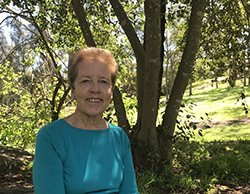
Helen Sobiesiak, Sackville, Retired Geography and Human Society in Its Environment teacher
"My ancestors lived here in Sackville in 1827. They would have worked and relied on the river. That’s my connection to the Hawkesbury. The fires of 2019/2020 were beyond anything we’ve experienced here, it was scary and distressing. We don’t seem to have any normal weather anymore, we
have extreme storms.
As a geographer you certainly recognize that everything is connected to everything else – that if we do something, there’s going to be an impact, a
repercussion. Also understanding a need to use resources in a way that they will last for future generations – that’s at the heart of what I’ve taught.
When I retired and let go of the responsibility of teaching and had time to think about things and read more, I recognized that I want more for my children and grandchildren. I feel now is the time I can give my energy to groups such as Stop Adani Hawkesbury. In the way that you live, you are modeling how to live sustainably, responsibly. I do that for my grandchildren.
It’s liberating to say, well what am I actually going to put my energy into? You can just sit and boil with rage or you can try and do something and connect with others who are also trying to do something. You can make a contribution, encourage others by being part of a community, try and create a better life, a better world for our kids, our grandchildren."
Sally Faulks, Local GP
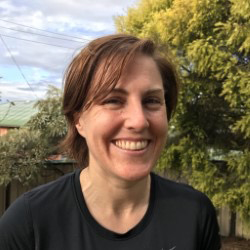
Dr. Sally Faulks, Richmond, General Practitioner (GP)
I come from a medical science background. We are living in a society now where science isn’t trusted - that’s frightening. I see it in my work as a GP, the direct effect of natural disasters and from a mental health point of view.
I have lived in multiple places where there have been fires and floods and increasingly as time goes on I feel I have climate anxiety. What’s the world going to look like in 10, 20, 30 years time. I’m worried that nothing’s really happening. I have young nieces and nephews, I’m anxious about what world they’re entering into. Climate change is foremost in a lot of my friends’ minds also, so we have a lot of discussions about this. My partner and I try to live as environmentally responsibly as we can. Ideally we would grow of our own food, live a simpler life.
One of the great things I’ve been involved in here in the Hawkesbury is the singing group Woman Song. Some of the songs have been written in response to these things that are happening in the world. That is a very powerful and emotional way of connecting about it..
Stephen Kearns, Minister and Business Owner
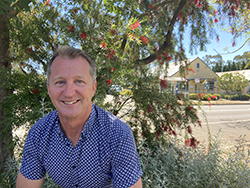
Pastor Stephen Kearns, Kurrajong, Minister for Kurrajong Baptist Church and Carpenter/Business Owner (Solid Art Design)
I’ve lived in the Hawkesbury for 11 years. I love the trees, nature and also the village environment here in Kurrajong. What are important to me are our relationships with each other, our community and our land. As humans we have this intimate relationship with our land. It’s our sustenance. That’s part of my religion.I’ve got to know a lot of the old guys who’s families have been here for generations and so I’ve gotten to see the impact of the environment on their
businesses. Some of their orchards up around Bilpin way for instance, between fires, droughts and heavy rain saturations, are closing. They won’t start again. Certainly it’s a harsh climate. Since last summer’s fires I’ve stood with old men here who’ve cried for 45 minutes and I walked away and cried, because it’s their life, their farm. Watching the fires unfold last summer we went, how can we help? What do you need? Part of that has been clean up, gardening kits, plant vouchers, and also looking at the impact on families. We put together a database around the churches. There were people from the community helping to clean up properties and people from around the country donating money. That to me is building resilience.
As a Christian, the mandate right from the beginning was we were to care for our environment, not rape and pillage it. I hope as we process the impact of our actions, good and bad upon our environment that together with our children we learn that the dollar is not the most important thing. Our environment is precious, sacred, dangerous. But we are strong and adversity is not bad, we have made it through adversity before. The oppositions as it were give us a chance to grow. There’s an excitement in how strong and aware and capable our young people are.
William Potter, Architecture Student
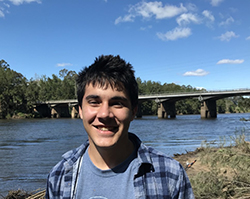
William Potter, North Richmond, Architecture Student
I’ve lived in the Hawkesbury my whole life so I’m very connected to this place. It’s very beautiful – as a visual person, when I think of it, I think of blue and green – the river, the mountains and trees.
My awareness of our changing climate has grown gradually. As my understanding of scientific literature grew, so to did my research into climate
change broaden. I have never and will never live through a year that’s below the twentieth century average in temperature. I will live in a world where there are climate impacts happening all the time. It’s hard to find someone who wasn’t impacted by last summer’s bushfires, so there’s a level of fear and dread there. During the fires I thought, this is what climate impact looks like for biodiversity – it’s crippling and that’s completely interconnected with climate change.
The biggest power I have as an individual is to lobby businesses and governments to change, which is what I spend a lot of my time doing. I’m giving a lot of my life to climate activism because it’s such an issue for me. A lot of my friends are feeling the same. I started the local group MESCA along with some friends and this allowed me to meet locals who I wouldn’t have otherwise met and I’m also involved in other organisations. Above anything climate change is an existence issue. So it’s not about saving forests or anything else, it’s an argument for saving ourselves and our civilization. This is our chance, our one chance to change before we can’t anymore. So take it on, take it seriously.
Craig Burley, Group Captain Hawkesbury RFS and Fire Consultant
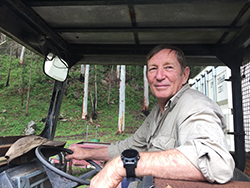
Craig Burley, Colo, Group Captain Hawkesbury RFS and Fire Consultant
Over the last 10-15 years we’ve seen an escalation in fire behaviour. We can anticipate more extremes of weather and more fires. Last summer we had fires the size of which we’ve never seen before and within the space of 6 weeks we had floods - in my little valley, the biggest flood since the 1940s. It’s increasing the personal risk that we all face.
What we’re doing thus far isn’t quite working, we need more tools in the toolbox. We’ve got a little too good at putting out fires, but there’s good fire and bad fire. I led the very first rapid aerial response with the sole purpose of putting fire out. I think we still need to do that, but I think there’s occasions when we need to let mother nature do her own thing.
Unless we do something different we’re headed down a pathway that’s not ideal, it’s concerning for my grandchildren. We can still reverse it if we’ve got the will and the commitment and that’s going to take some hard decisions. Everyone has got to do their own little bit, it's not just the politicians. I’m trying to do the right thing by the environment, I believe we’ve got to live smaller.
Want to get involved?
Find out ways you can take local action by exploring our digital map.
Mobile options:

